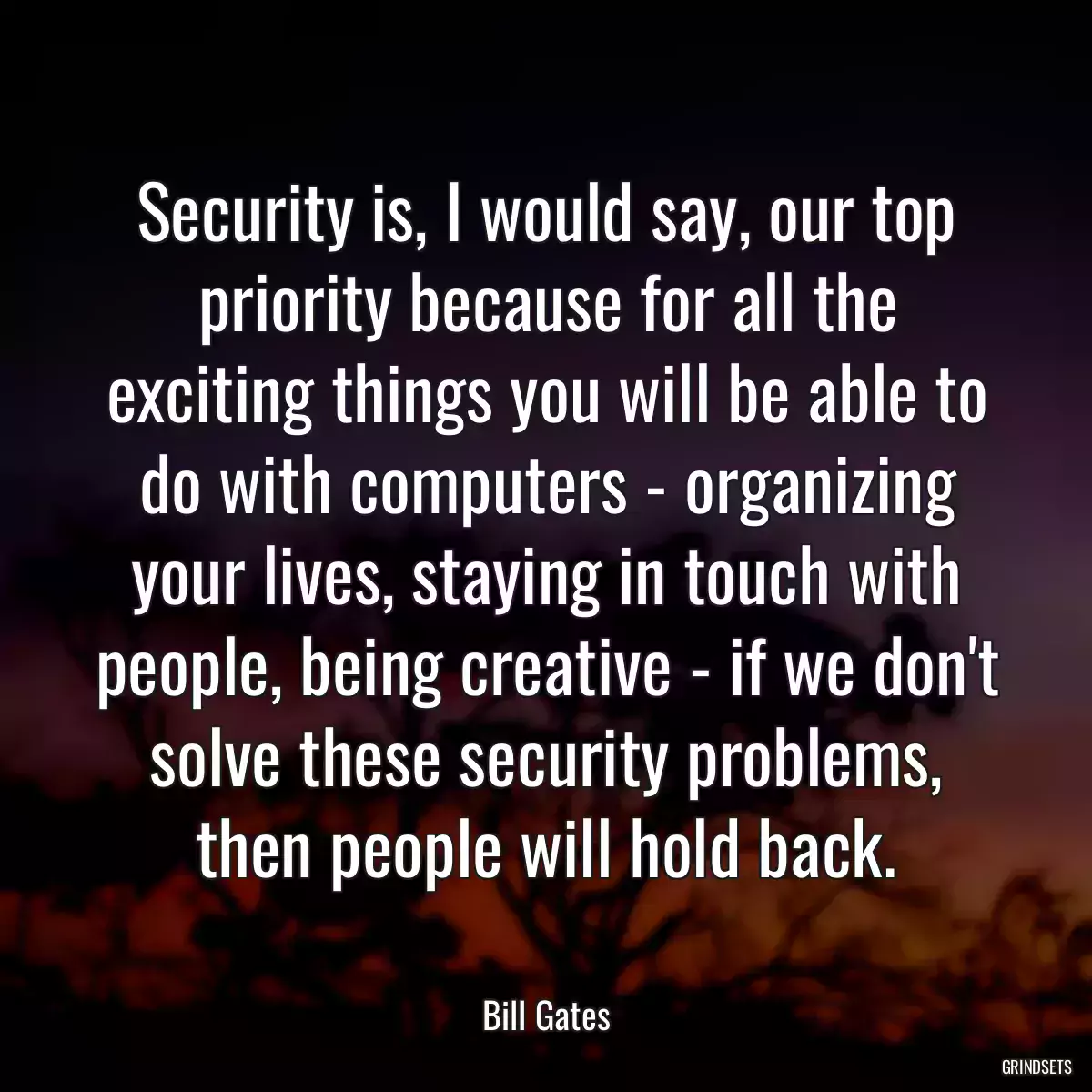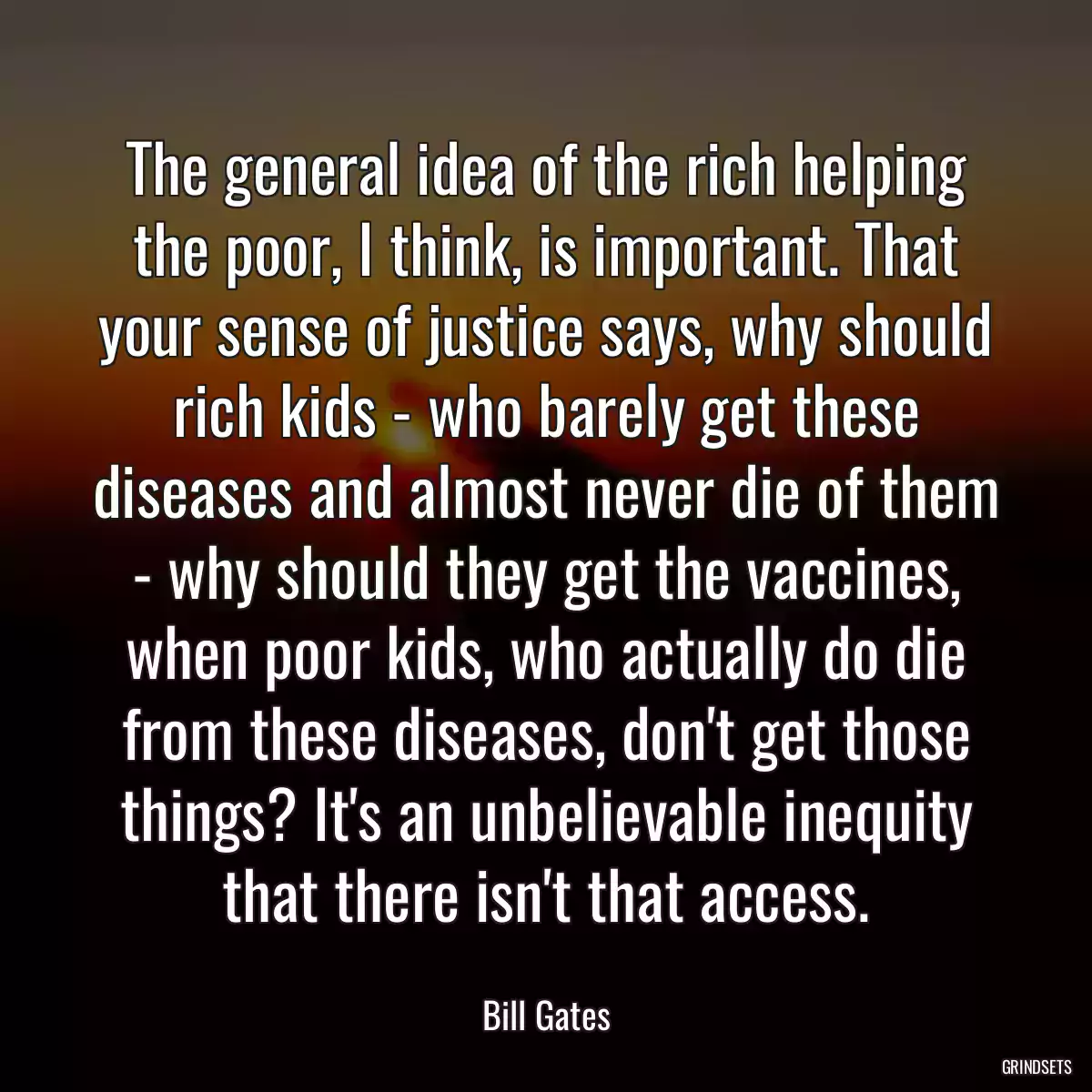
Quotes Bill Gates - page 3
Find dozens of Bill Gates with images to copy and share.

Certainly I'll never be able to put myself in the situation that people growing up in the less developed countries are in. I've gotten a bit of a sense of it by being out there and meeting people and talking with them.
The vision is that people should have the ultimate in convenience. Being able to get the things they care about on the appropriate device.
There's a basic philosophy here that by empowering...workers you'll make their jobs far more interesting, and they'll be able to work at a higher level than they would have without all that information just a few clicks away.
You may also like
Five years from now on the Web for free you’ll be able to find the best lectures in the world. It will be better than any single university.
Governments will always play a huge part in solving big problems. They set public policy and are uniquely able to provide the resources to make sure solutions reach everyone who needs them. They also fund basic research, which is a crucial component of the innovation that improves life for everyone.
Success is a lousy teacher. It seduces smart people into thinking they can't lose.
The world won't care about your self-esteem. The world will expect you to accomplish something BEFORE you feel good about yourself.
The US really has to get out in front. We are the biggest per person, by a substantial amount, greenhouse emitters, and we give the most foreign aid, not per person but in absolute.
![We [US] are the biggest per person, by a substantial amount, greenhouse emitters, and we give the most foreign aid, not per person but in absolute. This is another issue where hopefully we will take a long-term approach which, even though we sometimes have a hard time doing that, it\'s easier for us, as a rich country with this kind of scientific depth, than it is for the poor countries who will suffer the problems.](/fotos/90/9034146523cfa1359cca6c36b80151fb.webp)
We [US] are the biggest per person, by a substantial amount, greenhouse emitters, and we give the most foreign aid, not per person but in absolute. This is another issue where hopefully we will take a long-term approach which, even though we sometimes have a hard time doing that, it's easier for us, as a rich country with this kind of scientific depth, than it is for the poor countries who will suffer the problems.
Bitcoin is mostly about anonymous transactions, and I don't think over time that's a good way to go. I'm a huge believe in digital currency... but doing it on an anonymous basis I think that leads to some abuses, so I'm not involved in Bitcoin.
I think philanthropy is also growing and catching on. Figuring out how the philanthropy sector, which is quite small compared to the private sector, which is the biggest by far, and then the governments, you know, even in these poor countries over time has to take on these key responsibilities. How does philanthropy accelerate that? Drive the kind of innovations, make sure they get used well. So it plays this kind of special role.
People who say they don't see the acceleration of innovation is a wilful blindness. We are innovation at a wonderful speed for the basic things we think everyone should get.
Now we've got that [children's death rate] down to about 5 percent, so we've more than cut it in half, and that's because we're getting vaccines out, economic improvement also helps there, but the vaccines are why we've seen an acceleration in getting that down.
Well the Global Fund, because of how well it's worked on not only AIDS, but also malaria and tuberculosis, I'd say it's well accepted. I mean, it's not politically controversial that this is a great humanitarian effort. But budgets are very very tight.
If there was an epidemic, that definitely would make people accept vaccines. I wouldn't hope for that, of course, but if you wanted people to love vaccines, an epidemic would remind them how magical they are.
People always fear change. People feared electricity when it was invented, didn't they? People feared coal, they feared gas-powered engines... There will always be ignorance, and ignorance leads to fear. But with time, people will come to accept their silicon masters.
With a public library card in your hand, you have access to the Internet and a world of opportunities.
You may also like

The general idea of the rich helping the poor, I think, is important. That your sense of justice says, why should rich kids - who barely get these diseases and almost never die of them - why should they get the vaccines, when poor kids, who actually do die from these diseases, don't get those things? It's an unbelievable inequity that there isn't that access.
If you get health, then you have opportunity for literacy. Health first, then literacy. Once you have literacy, then you have a chance to bring in the new tools of communication. Let people reach out and have access to the latest advances.